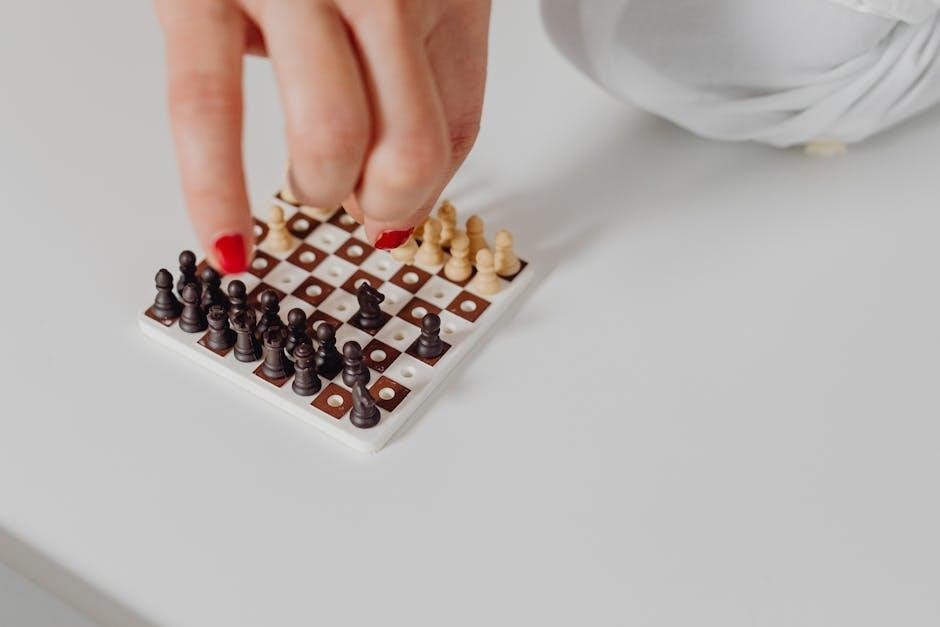The Mini Mental State Examination is a widely used test‚ available on the NHS website as a pdf‚ assessing cognitive function and memory‚ with a maximum score of 30 points‚ using
- lists to score․
Explanation of the Examination
The Mini Mental State Examination is a comprehensive assessment tool used to evaluate cognitive function and memory‚ as stated on the NHS website‚ which provides a downloadable pdf version of the test․
The examination is divided into several sections‚ each designed to assess a specific aspect of cognitive function‚ including orientation‚ registration‚ attention‚ and calculation‚ as well as language and visuospatial skills․
The test is typically administered by a healthcare professional and takes approximately 5-10 minutes to complete․
The results of the examination are used to diagnose and monitor cognitive impairment‚ with a maximum score of 30 points indicating normal cognitive function․
According to the NHS pdf‚ the examination is a useful tool for assessing patients with suspected dementia or other cognitive disorders․
The Mini Mental State Examination has been widely used and validated in clinical settings‚ and its results are often used in conjunction with other diagnostic tools to inform treatment decisions․
Overall‚ the examination provides a detailed and comprehensive assessment of cognitive function‚ making it a valuable tool for healthcare professionals․
The NHS website provides detailed instructions for administering and scoring the examination‚ as well as guidance on interpreting the results․
The Mini Mental State Examination is an essential tool for healthcare professionals working with patients with cognitive impairment․

Orientation to Time and Place
Assesses patient’s ability to identify time and place‚ using
- lists‚ with questions about day‚ date‚ and location‚ as per the NHS pdf guidelines for the Mini Mental State Examination test․
Questions Asked During the Examination
The Mini Mental State Examination‚ as outlined in the NHS pdf‚ consists of a series of questions designed to assess cognitive function and memory․ The questions asked during the examination are standardized and include items such as what is the day of the week‚ what is the date today‚ and what is the year․ The examiner will also ask the patient to identify their location‚ including the country‚ town‚ and hospital․ Additionally‚ the patient will be asked to recall the names of three objects‚ such as an apple‚ table‚ and penny‚ which are named by the examiner․ The patient’s ability to repeat these words‚ as well as their ability to perform simple calculations‚ such as subtracting 7 from 100‚ are also assessed․ The questions are designed to be straightforward and easy to understand‚ with the goal of evaluating the patient’s cognitive function and identifying any potential deficits․ The NHS pdf provides a comprehensive guide to the questions asked during the examination․

Administration of the Examination
The examiner administers the test‚ using a
- list
to score‚ in a quiet room‚ with the NHS pdf guidelines․
Instructions for the Examiner
The instructions for the examiner are provided in the NHS pdf guide‚ which outlines the steps to administer the Mini Mental State Examination․ The examiner should introduce themselves and explain the purpose of the test‚ using a clear and concise language․ The test should be administered in a quiet and comfortable room‚ free from distractions‚ with the patient sitting comfortably․ The examiner should use a standardized script‚ as outlined in the NHS pdf‚ to ensure consistency and accuracy․ The script includes instructions for each section of the test‚ including orientation‚ registration‚ attention‚ and recall․ The examiner should score the patient’s responses‚ using a scoring system‚ and record the results on the NHS pdf form․ The instructions also emphasize the importance of maintaining a neutral and non-judgmental attitude‚ and avoiding leading questions or prompts․ By following the instructions‚ the examiner can ensure that the test is administered fairly and accurately‚ and that the results are reliable and valid․ The NHS pdf guide provides a comprehensive overview of the instructions‚ and is an essential resource for examiners administering the Mini Mental State Examination․

Components of the Examination
The examination consists of several key
- components‚ including orientation‚ registration‚ and language assessment‚ using a standardized NHS pdf format to evaluate cognitive function․
Orientation‚ Registration‚ Attention‚ and Calculation
The mini mental state examination assesses various cognitive functions‚ including orientation‚ registration‚ attention‚ and calculation‚ as outlined in the NHS pdf guide․ The orientation section evaluates the patient’s ability to identify the current time‚ place‚ and date․ Registration tests the patient’s ability to repeat and remember words‚ while attention and calculation assess the patient’s ability to perform simple arithmetic operations․ The NHS pdf provides a standardized format for administering and scoring the examination‚ ensuring consistency and accuracy․ The examination is typically administered by a healthcare professional and takes approximately 10-15 minutes to complete․ The results are then used to assess the patient’s cognitive function and identify any potential issues․ The NHS pdf guide provides detailed instructions for administering and interpreting the results of the mini mental state examination‚ making it a valuable resource for healthcare professionals․ The guide also includes examples of questions and tasks used in the examination․

Reliability of the Examination
The examination has high reliability‚ with studies showing consistent results‚ using standardized methods‚ as stated in the NHS pdf‚ to ensure accurate assessments of cognitive function and memory․
Comparison with the Traditional Mini-Mental State Examination
The mini mental state examination NHS pdf provides a comparison with the traditional mini-mental state examination‚ showing that the standardized version has improved reliability and validity‚ as stated in the American Journal of Psychiatry․
The study by Molloy et al‚ found that the standardized mini-mental state examination had a higher test-retest reliability coefficient‚ and a higher inter-rater reliability coefficient‚ compared to the traditional version․
This suggests that the standardized version is more consistent and accurate‚ making it a more reliable tool for assessing cognitive function and memory․
The NHS pdf also provides information on the administration and scoring of the examination‚ including the use of a standardized questionnaire and a clear scoring system․
The comparison with the traditional mini-mental state examination is important‚ as it allows healthcare professionals to understand the benefits and limitations of each version‚ and to make informed decisions about which version to use in clinical practice․
The mini mental state examination NHS pdf is a valuable resource for healthcare professionals‚ providing information on the development‚ administration‚ and interpretation of the examination․
It is widely used in clinical practice‚ and is an essential tool for assessing cognitive function and memory in patients with a range of neurological and psychiatric conditions․
The examination is also used in research studies‚ to investigate the effects of different treatments and interventions on cognitive function and memory․
Overall‚ the mini mental state examination NHS pdf is a useful resource for healthcare professionals‚ providing information on the comparison with the traditional mini-mental state examination‚ and the administration and interpretation of the examination․
